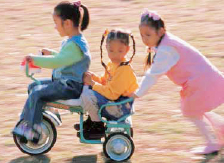IQ and academic promise alone do not make for a happy child. What does is being liked and getting along well with other children. This ability to form healthy peer relationships is so important that it can affect your child’s social and cognitive development. In fact, children should achieve minimal social competence by about age 6 or they might risk poor mental health and difficulties in school and the workplace later on.
Children with good social skills usually have healthy self-esteem. They tend to smile more readily, feel good about themselves and generally find it easier to handle difficulties. All these qualities make them more likeable and agreeable, thus making them more friends, as a result.
On the other hand, children who have low self-esteem tend to face challenges with anxiety and frustration. Thinking poorly of themselves and harbouring self-critical thoughts (“I’m no good” or “I can’t do anything right”), they have a hard time finding solutions. Becoming passive, withdrawn or depressed only makes it harder for them to develop friendships.
As a parent, your role in building your child’s self esteem begins from very early in her life. As an infant, everything she does is difficult – even rolling over or taking the first tentative steps. Encourage her efforts and when she finally succeeds, be sure to lavish her with praise.
From toddlerhood and onwards, your child will start forming conclusions about herself. It’s important that you help her succeed in the things she tries to do – whether it’s learning a new skill or playing a new game. Using words she can understand, tell her what to do or not to do. After she’s done it, tell her how well she performed. Knowing she did something right will boost her self-esteem. In turn, this will give her greater confidence to take on new challenges.
GETTING ALONG WITH OTHERS
Your child has every right to expect that relationships with others will be rewarding. However, you have to first demonstrate it in your own relationship with her.
Children who display high levels of social competence typically enjoy parent-child relationships that are characterised by agreeable interactions, acceptance and a high degree of sensitivity to each other’s cues. Parents in such relationships also minimise the use of physical punishment and force.
In this kind of relationship, you can help your child develop good social skills by doing the following:
- Establish and keep repeating a set of rules or standards for acceptable behaviour, eg “Respect ourselves, others and things”.
- Be aware of the behaviour you model. Every time you talk kindly to her, you are teaching her how to talk kindly to others.
- Play allows a child to learn crucial skills. So, play with your child in a ‘peer-like’ way, just for the sake of having fun. Avoid criticising her and don’t be too directive. Instead, laugh and smile often. This will make your child feel that she is a good play partner and, in turn, make her eager to play with others.
- From an early age, give your child opportunities to play with her peers. She will clearly be at an advantage when she enters more formal group settings, like preschool.
- Based on what happens each day, talk with your child about social relationships and values. Do it in an enjoyable conversational way and avoid lecturing her. This kind of interaction tells your child that you have an interest in her well-being and provides a time for swapping information and discussing problems.
- Encourage positive behaviour by teaching your child specific social skills, like how to consider the feelings of others. For example, if your child hits another, tell her, “You hurt that little boy and made him cry.”
- Don’t just TELL, but TEACH, your child to share. Have her take turns with the other children. Divide the toys up so that everyone has some. Or find a way for them all to play together with the toys.
- If your child wants to play with other children but does not know how to join in, teach her how to ask.
- Also, teach her what to say when she is hurt or bullied by other children, like “That really hurts!” and “Stop that!”.
- You don’t have to know the answers to all of your child’s problems but you can guide her in solving them.
- Do not dismiss your child’s concerns or trivialise their complexity by offering flippant answers.
- Social rejection makes children react with anger, dismay or passive acceptance. If your child faces rejection by her peers, do not allow her to think that it was because of a personal deficiency (eg “I’m just not much fun,” “Other kids don’t like me”). Avoid making things worse with defeatist comments, like “Maybe they don’t like you”.
- Always adopt a positive attitude when helping your child to deal with difficult social situations. Offer suggestions like, “Maybe they don’t want to play that game but another one.” Your constructiveness will help her try to improve social situations with effort and positive behaviour.
INTERVENE WISELY
Toddlers need constant supervision. However, as research has shown, parents’ doting presence and constant interference does not benefit children as they grow older. In fact, their development of social skills may be impeded.
Thus, if your child has to struggle (let’s say in pre-school) to make friends, let her. Unless really necessary, do not interfere too readily or force social situations to her advantage. The experience will teach her to recognise and handle different circumstances.
The best thing for you to do is to keep assuring her that you are her unconditional friend. And that you’ll always be around to guide and encourage her as she goes through the joys and pains of making friends.







Comments